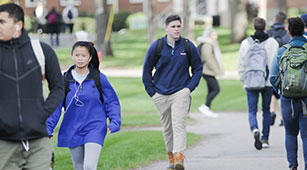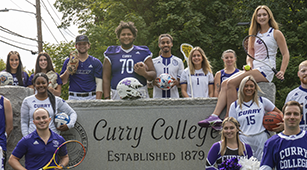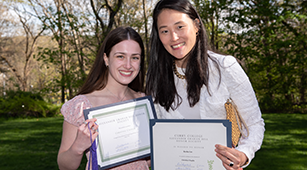Schedule an appointment to meet with Career & Experiential Learning about your area of interest.
Make an AppointmentContact the Writing Program
- 617-333-2968
- writingprogram@curry.edu
- Curry College, Milton Campus
The Faculty Writing Fellows program cultivates and supports a culture of writing at Curry College. The program supports other efforts to retain and prepare students to be successful, bolster the vertical writing curriculum established through the General Education Program, and make written communication a hallmark of the Curry experience.
Fellows take part in an intensive, hybrid course during Spring semester. In the subsequent two (2) academic years, Fellows serve as advisors on the teaching, response, and assessment of writing within their discipline for their respective departments and serve as members of the Writing Council to assess the RWE course requirements and implementation. Fellows also agree to teach at least one (1) RWE course each year for the three (3) years following.
The Fellows structure is not a top-down one. We draw on the collective knowledge of the community to determine how disciplinary differences play out in reading, writing, and critical reasoning. Understanding these differences helps our students because we are then able to articulate these differences and how they affect instructors’ reading of student writing. This work is driven by scholarly literature in WAC/WID and current best practices in the Scholarship of Teaching and Learning (SoTL).
Fellows should either currently teach an RWE course or be interested in teaching an RWE course and may use the Fellows program to become certified to teach RWE courses, like we certify online teaching. Certification allows sufficient academic freedom for individual faculty members to run a course with an RWE enhancement without making all sections of the course RWE (subject to RWE and Gen Ed approval).
At present, the program is limited to Full-Time Faculty members, as outlined in the CBA.
After completing the course, individuals teach at least one (1) RWE course per year for three (3) years. Individuals will also serve a two-year term, during which they are expected to:
- serve as advisors to faculty members within their respective department on the teaching, response, and assessment of writing within their discipline (e.g., assisting faculty with the drafting of new RWE proposals, discussing writing assessment practices within the department);
- be observed in one (1) RWE course per year (by a prospective RWE instructor and/or RWE Coordinator);
- meet as needed to provide feedback for curriculum changes, including RWE course requirements and RWE assessment;
- share their new insights publicly, through ET dinners, Faculty Retreat, conference presentations, and publication.
In return for their time and service, Faculty Writing Fellows will receive:
- one (1) course release during semester they take the hybrid course;
- a Certificate of Completion for their DEC file;
- the ability to make any course section they teach RWE (regardless of whether other sections are designated as such);
- ongoing support from the RWE Coordinator in publication and presentation opportunities related to writing studies (i.e., articles on teaching writing for disciplinary trade journals);
- ongoing support from the RWE Coordinator for testing these same pedagogical principles in introductory/First-Year courses.
The program orients participants to current theory and best practices in reading and writing implementation and assessment, with an emphasis on activating students’ critical reasoning skills. As a full group, participants explore the following topics:
What is “good” writing?: Understanding disciplinary differences
Rooted in the who, when, where, what, and why of writing, this workshop will explore how our motives as writers are part of a system of disciplinary activity and how our experiences with these systems influence the ways we evaluate student texts. Fellows will experience and understand the significant differences in expectations students experience at Curry with regard to writing.
Critical Reasoning in the Disciplines
Critical Reasoning (or Critical Thinking) are terms that we hear quite a lot about in today’s academic climate, but what does it actually mean? This workshop begins by formulating a common definition of the term, followed by asking faculty to “map” what critical reasoning looks like in the field. How do they recognize good reasoning when they see it? Can they identify specific areas where students have challenges? These map and gap exercises will provide the foundation for later assignment designs.
The Reading-Writing Relationship
While it is easy to see when students are struggling with writing, it isn’t always easy to see when they struggle with reading or how their reading practices are influencing their writing. This workshop will begin with a discussion of the cognitive relationship between the practices of reading and writing. This is followed by guiding faculty in activities to make their disciplinary reading practices explicit. We will practice classroom activities that will help faculty see where students are struggling in their reading of disciplinary texts, as well as those aimed at improving content retention.
Designing Effective Writing Assignments
According to Melzer (2014), nearly 66% of writing assignments in college ask students to summarize content only. But what does summary actually tell us about our students’ learning? This workshop will explore the ways we can design writing assignments to see student learning (i.e., understanding content), reasoning (i.e., synthesizing information to form conclusions), and rhetorical skill (i.e., communicating as a member of the disciplinary community). We will draw on existing assignments to determine what they are asking students to do, discuss the types of writing assignments that are suitable for our specific courses, and work toward identifying a breadth of assignments that provide students an opportunity to better demonstrate what we wish to assess.
Fair Writing Assessment
What makes an ‘A’ paper an ‘A’ and not a ‘B’? How do we handle grammar and mechanics in student writing? What is a “fair” assessment of student writing in our disciplinary courses? At what point do we provide feedback and how much do we provide? This workshop will draw on the knowledge built in the previous workshops to clarify best practices in assessing student writing. We will investigate the intertwined nature of writing assignments with assessment practices and learn to design rubrics that streamline our grading, while also helping students understand our expectations as instructors. We will identify when formative and summative assessment strategies are most appropriate, and also discuss how common practices (like grading heavily for grammar and mechanics) can disproportionally harm certain population groups.
Multilingual Writers/Writing
The work of learning to write and speak in another language is an incredibly difficult and time-consuming task. Many times, our multilingual writers are learning English as their third or fourth language and have to reconcile the linguistic structure of their other languages with one that had many hidden and illogical rules. This final workshop in the series will explore the ways in which our work with multilingual writers is different from those whose native language is English (even those who speak different dialects). We will examine the wide variety in fluency, accuracy, quality, and structure of writing between L1 and L2/3/4 writers and strategies for helping multilingual writers in our classrooms.





